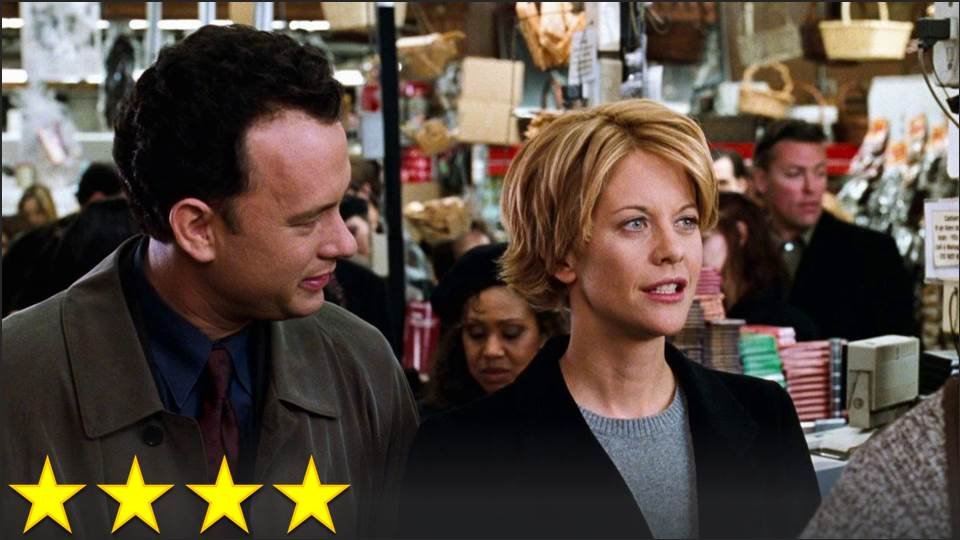I’d like to take a moment to focus on a film called The Shop Around the Corner. This is a classic Ernst Lubitsch comedy that I highly recommend. It’s very funny and clever, and it established certain stylistic elements of the romantic comedy that have continued to this day. In short, two employees of a furniture store don’t get along well, but then one of them discovers that the other has been his pen pal, with whom he’s anonymously been exchanging love letters. It features a great cast of actors, many of whom I recognized from other films of the era (including the great and powerful Frank Morgan), and the plot is captivating from start to finish. It becomes particularly interesting when the protagonist, played by James Stewart, starts to use the knowledge he has of his correspondent’s identity to mess with and manipulate her, before ultimately making her fall in love with him.
This leads me to the film that follows in its footsteps, You’ve Got Mail. This film is very smart in that it takes full advantage of the new technology of the time – the personal email – to tell a new kind of story, while at the same time recycling elements of a classic story. The characters are very likable, and the story is captivating enough, but the moment that absolutely blew me away is when the film suddenly turns into a line-for-line remake of a scene from The Shop Around the Corner. It’s one of the greatest homages in history simply because it’s a movie doing an impression of its father, which is hardly ever seen. That being said, the movie’s main problem seems to be how it is too much like its predecessor: it follows the old story of a man who’s mission is to manipulate the woman until he gets what he wants from her – a story of masculine domination. Since the film is coming from a female director, I would hope for some sort of a creative break from this old formula, rather than a film that follows along with Hollywood’s boring old habit of making the formation of the couple synonymous with the psychological battle of a man conquering a woman’s mind. It’s actually very strange to see just how forgiving Meg Ryan’s character is of Hanks’ after he’s completely destroyed her family business, when he could have saved it just by stopping the development of the Fox store’s children’s section and establishing a partnership between the store and the shop, essentially making her store the Fox children’s section.
Now, I’ve spoken many a time before about the ‘80s charm – the special power that ‘80s movies have over me even when I know they’re stupid (or perhaps especially when I know they’re stupid). I am, however, a child of the ‘90s, so I also get nostalgic about this period as well. When something strikes me as extremely ‘90s, it can have about the same effect on me as something extremely ‘80s has – it’s emblematic of just how cute we humans are when we think our trends, fashions, technology, music, and life-choices isn’t really as absurd as it will seem in the future. I think sometime around Vietnam we see American culture hit its mid-life crisis as a result of the country’s depression, so Americans wore their hair long and made over-the-top music and acted more sophisticated than they really were and did everything in their power to embrace a new American value: individuality. We dragged the rest of western culture into the pits of idiosyncrasy with us, and borrowed from what Europe had that already fit this philosophy: the avant-garde, David Bowie, Python humor, Expressionism, and so on and so forth. We are still in this crisis today, but while we’re waiting for our kids to dye their hair purple for “2010s Day” at high school, we can just enjoy how charming the sights and sounds of ‘90s cinema can be. You’ve Got Mail is one of the greatest examples of the warm, fuzzy feeling that comes with a trip back to the ‘90s, and everything from its leading lady’s hairdo to its title to its soundtrack (especially that song by the Cranberries) makes the film into a perfect time capsule.
With all this in mind, I can still say that I appreciate the film greatly, even if I find it rather hackneyed, trite, and overly submissive to tired patriarchal tradition. I can also say that I’m tired of the old stereotype of the male romantic lead always being an obnoxious jerk at the beginning, but this I am also willing to forgive. Ultimately, the film wins me over because it’s story is fascinating (even if we know how it’s going to play out), it made me care about the characters, and it has a special kind of charm about it. I tip my hat to Nora Ephron for creating such an impressive and enjoyable contemporary film classic.
